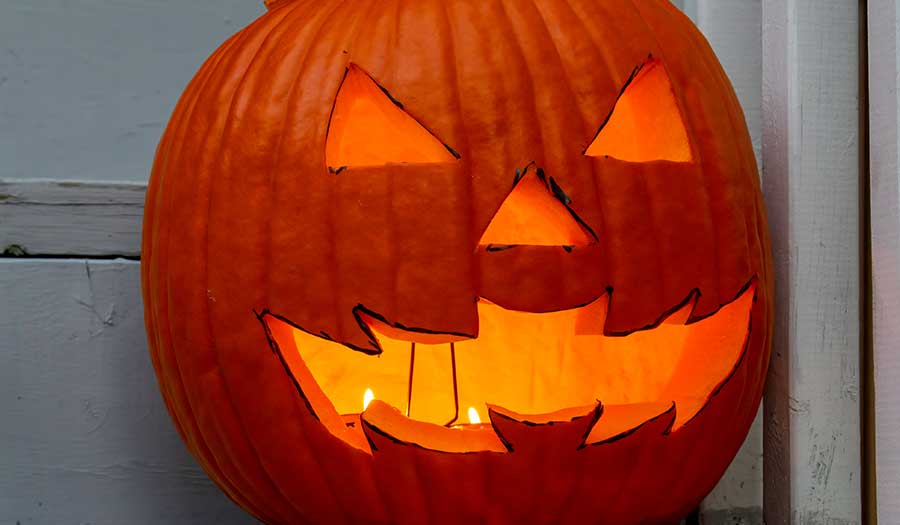 Getty Images
Getty Images
Article
It is more than candy and costumes. See how the Bible measures this popular holiday.
Learn the why behind the headlines.
Subscribe to the Real Truth for FREE news and analysis.
Subscribe NowYou have probably enjoyed at least some part of Halloween before. Maybe it was seeing your kids dressed up as their favorite characters. Maybe it was a hayride, visit to a pumpkin patch, school party—or just savoring a favorite candy.
But you have also seen the other side of the day. Front lawns covered in skeletons and tombstones. Stores filled with masks of witches, ghosts and demons. TV shows and movies celebrating fear and the occult.
If you have ever paused in the middle of all this and thought, Something about this doesn’t feel right, you are not alone. Many who take the Bible seriously question whether Halloween fits the life God calls them to live.
So how should you look at the holiday? More importantly, what does God think of Halloween?
Since the Bible is the inspired Word of God, it provides clear answers. Is Halloween merely a playful custom—or does it carry deeper spiritual implications? Could its origins reveal something more serious than most have considered?
Behind the decorations, costumes and traditions lies a troubling history that still shapes how the day is celebrated.
Holiday Origins
Halloween’s roots reach back to ancient pagan rites, particularly the Celtic festival of Samhain (pronounced “sow-in”).
This was not a children’s holiday. It was a religious observance marking the end of harvest and the beginning of winter—a season associated with death. Ancient Celts believed that on October 31, the boundary between the living and the dead was at its weakest, allowing spirits to roam the Earth. To ward them off or earn their favor, people lit fires, wore disguises and left out food as offerings.
Later, the Roman Catholic Church attempted to christianize the pagan observance by establishing All Saints’ Day on November 1, with October 31 becoming All Hallows’ Eve, which was eventually shortened to Halloween.
From the Bible’s perspective, where a custom comes from matters. God makes clear that His people are not to adopt traditions rooted in false worship: “Do not inquire after their gods, saying, ‘How did these nations serve their gods? I also will do likewise.’ You shall not worship the Lord your God in that way” (Deut. 12:30-31, New King James Version). And He adds through Jeremiah: “Learn not the way of the heathen…For the customs of the people are vain” (10:2-3).
These verses show that God does not separate the practice of a religious custom from its source. If its roots are in false worship, He does not want His people to take part in it, no matter how much the meaning has shifted over time.
Vain Tradition
While God did not establish Halloween, He did command certain Holy Days in Leviticus 23 such as Passover and the Feast of Tabernacles. These are the days He designed for His people.
Jesus Christ warned about replacing God’s ways with pagan human traditions: “In vain do they worship Me, teaching for doctrines the commandments of men” (Mark 7:7).
The Greek word translated “in vain” carries strong meaning. According to Strong’s Hebrew and Greek Dictionaries, it conveys the idea of “tentative manipulation,” an “unsuccessful search,” or “folly…to no purpose.” The Mounce Concise Greek-English Dictionary defines it as “fruitlessly, without profit.”
In other words, all the effort a person puts into worshiping God—if it is mixed with pagan traditions—becomes empty. No matter the sincerity, God says it produces nothing lasting.
This is where the connection to Halloween’s origins becomes important. Its customs were not given by God. They grew out of beliefs and practices that He clearly says to avoid. Over time, these practices were rebranded, softened or even given Christian labels, but that does not change where they came from. God says, “Abstain from all appearance of evil” (I Thes. 5:22).
From God’s perspective, even appearing to celebrate darkness is something to avoid—whether it is dressing as something frightening or simply joining in customs that came from false worship. People may not be thinking of ancient Samhain rituals as they participate, but the true origins remain.
If your goal is to honor God, does Halloween really reflect the kind of worship He accepts?
What the Day Promotes
Halloween’s origins alone show why God rejects it. Yet, even setting history aside, what the holiday promotes today still runs counter to His Way.
Think about what fills your neighborhood, store aisles and TV screens each October—witches, demons, vampires, goblins, ghosts. These are more than harmless decorations. They turn spiritual darkness into entertainment.
God commands His people to “have no fellowship with the unfruitful works of darkness, but rather reprove them” (Eph. 5:11). To “reprove” means to expose and correct—not to blend in with or celebrate behavior contrary to the Bible. While it is not your responsibility to police what others do, it is your duty to govern your own actions and your children’s.
Even if your family’s costumes are lighthearted—superheroes, princesses and animals—participation still links you to a celebration built on fear, superstition and death. This sends a mixed message, especially to children still learning what to value and what to reject.
Parents, consider: What is your child learning to see as normal or fun? When excitement, candy and friends are tied to images of death and the occult, what message is taking root?
The Bible warns: “Woe unto them that call evil good, and good evil…that put darkness for light, and light for darkness” (Isa. 5:20). Halloween takes what the Bible calls evil and turns it into amusement.
God’s Standard
If God tells His people to avoid darkness, what should they seek instead? The Bible lays out a clear contrast: “What fellowship has righteousness with unrighteousness? And what communion has light with darkness?” (II Cor. 6:14).
God’s standard is not just “avoid what’s wrong.” He also calls His people to fill their lives with what is good. Philippians 4:8 lists it plainly: whatever is true, honorable, just, pure, lovely, of good report—to “think on these things.”
Measured against that standard, does Halloween pass? Take just one word from that list—pure. Or another—lovely. The day’s focus on fear and the occult falls short every time.
God wants His people to be a light to the world (Matt. 5:14-16), to stand out from the darkness around them. This means choosing celebrations and traditions that reflect His character, not those rooted in or centered on what He calls evil.
A Clear Choice
Each year, many who take the Bible seriously approach Halloween with trepidation. They may not want their children to feel left out. They may not want to cause tension with friends, family or their community.
But God calls His people to a higher standard: “You are a chosen generation, a royal priesthood, a holy nation…called…out of darkness into His marvelous light” (I Pet. 2:9). True Christianity means standing apart from traditions that glorify what God calls evil, even when those traditions are popular or wrapped in seemingly harmless fun.
So ask yourself: If Jesus Christ stood at your door this October 31, would you be comfortable explaining your Halloween plans to Him? Would the example you are setting point toward light, or toward the darkness God commands us to avoid?
God says, “I have set before you life and death…therefore choose life” (Deut. 30:19). The choice is clear. Leave behind customs rooted in darkness. Fill your life with what reflects God’s truth—and teach your children to do the same.
- Real Truth Magazine Articles
- SOCIETY & LIFESTYLES
 Magic, Horror and the Occult—Why the Attraction?
Magic, Horror and the Occult—Why the Attraction?


